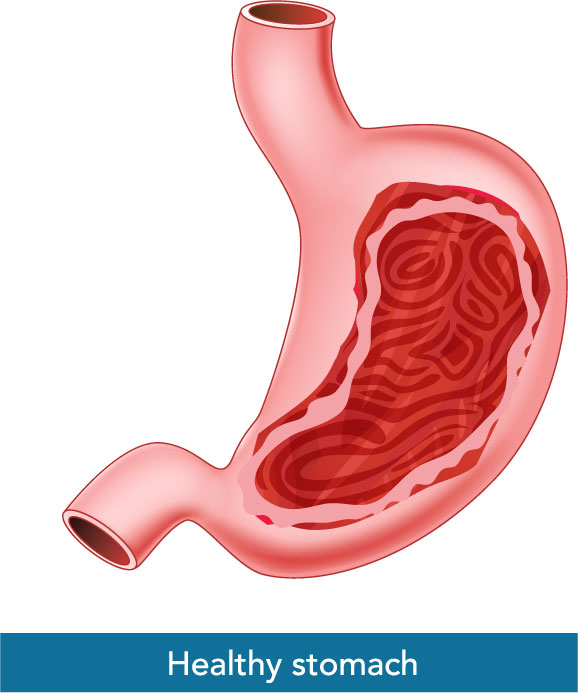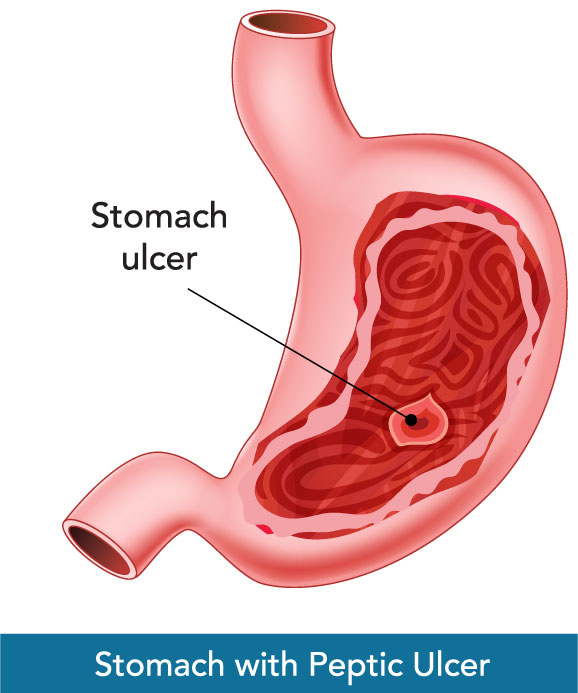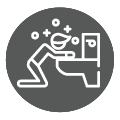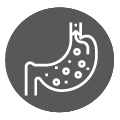Peptic Ulcer
Stomach Ulcer
Peptic ulcers are sores that develop in the lining of the stomach or duodenum (first part of the small intestine). These sores are formed as a result of chronic irritation from offending materials to the protective lining of the stomach, which lead to inflammation and sore formation.
Inflammation is usually caused by infection in the stomach or by some medication such as pain killers.


Some patients may not experience any symptoms. Others may have symptoms that include:

Abdominal discomfort in the upper abdomen

Changes in appetite or no appetite

Nausea or vomiting

Bloating or indigestion

Loss of appetite and consequently weight loss in gastric ulcers

Weight gain in duodenal ulcer as pain is relieved by eating

Melena

Melena
In some patients, ulcer can lead to serious consequences, which include:

Bleeding, which may manifest in bloody or dark coloured vomiting or stools

Perforation, a hole in the wall of the stomach or duodenum. This causes severe abdominal pain, which may be associated with fever.

Stricture or obstruction (a narrowing of intestine which may lead to obstruction). This causes bloating, distention, nausea or vomiting or abdominal pain shortly after a meal. It may also case weight loss.
Causes of peptic ulcer
- Helicobacter pylori (H. pylori) (a bacteria that can cause stomach infection and inflammation)
- Frequent use of non-steroidal anti-inflammatory drugs(NSAIDs), such as painkillers
- Smoking
- Excessive alcohol
- Radiation therapy
- Stomach cancer
How is peptic ulcer detected/diagnosed?
When patients experience symptoms of peptic ulcer, your doctor may request blood tests and an upper gastrointestinal endoscopy. The blood tests will determine whether you have experience blood loss from the ulcer and other possible abnormalities that were caused by the blood loss.
An upper gastrointestinal endoscopy or oesophagogastroduodenoscopy (OGDS) is both a diagnostic and therapeutic tool, which is inserted down your throat and into your stomach and small intestine to examine the area for ulcers. If there is active bleeding from the ulcer, the doctor will deliver treatment directly through the endoscope onto the ulcer and stop the bleeding.

Know your treatment options at CVSKL’s gastro centre
Treatments of peptic ulcer depend on the cause. Most of the time, it can be managed with medication and lifestyle changes.
If tests show that you have an H. pylori infection, your doctor will prescribe medication which usually lasts up to two weeks. The medications include antibiotics to help kill infections and proton pump inhibitors (PPIs) to help reduce the secretion of stomach acid. The main action is a prolonged reduction of stomach acid secretion.
If test results show that you do not have an H. pylori infection, your doctor may recommend medication that reduces stomach acid for a period of time to help your ulcer heal. However, some patients may be required to take medication for life if they experience serious problems. The doctor may advise on the usage of alcohol or painkillers. You may be required to stop smoking.
For six weeks after the index endoscopy, a follow-up endoscopy may be ordered to assess the healing of the ulcer. Further courses of medications may be required if the ulcer is not healed.
After the initial endoscopy, a follow-up endoscopy may be ordered to assess the healing of the ulcer and to ensure the eradication of H. pylori.





